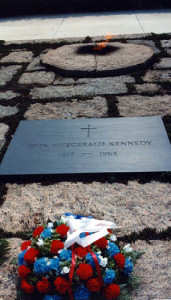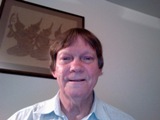Where Were You When John F. Kennedy Was Shot? Bill Preston (Thailand 1977-80) Remembers
 Dwight Morrow High School, Englewood, New Jersey. Tenth grade biology class. There was the usual buzz of adolescent chatter as we straggled in from gym the previous period and shuffled to our seats. Restless teens, we were looking past biology to the end of the school day and the long Thanksgiving holiday. I took my seat in the back of the classroom just in front of Martin Levine. Our biology teacher, Dr. Hill, radiated a fierce intelligence and seriousness of purpose that kept you on your toes and made you want to up your game. He wore those generic, no-nonsense black-framed glasses that bestowed an added, if superfluous, sense of gravitas.
Dwight Morrow High School, Englewood, New Jersey. Tenth grade biology class. There was the usual buzz of adolescent chatter as we straggled in from gym the previous period and shuffled to our seats. Restless teens, we were looking past biology to the end of the school day and the long Thanksgiving holiday. I took my seat in the back of the classroom just in front of Martin Levine. Our biology teacher, Dr. Hill, radiated a fierce intelligence and seriousness of purpose that kept you on your toes and made you want to up your game. He wore those generic, no-nonsense black-framed glasses that bestowed an added, if superfluous, sense of gravitas.
The moment Dr, Hill walked into class, we all sensed something serious had happened. One of two African-American teachers at Dwight Morrow back then–both of them PhDs, unlike their majority white peers–Dr. Hill carried himself with quiet dignity and grace. This day he was shaken, his face ashen, entering the room in a kind of daze, looking lost. Wandering past his desk, he paused a moment to gaze out the second floor window. His body slumped a bit, as if he were carrying the weight of the world. When he finally spoke, the words were tentative, as if by uttering them he was confirming something he didn’t want to believe. “The country has undergone a terrible tragedy. I’m afraid that the President has been shot.”
I don’t know if Dr. Hill knew at that point whether President Kennedy was dead. I believe he simply sat down at his desk in silence, while we all tried to take in the meaning of his words. Some students began to cry, most of us sat in stunned silence. Marty and I exchanged glances of disbelief. Class was soon dismissed: an announcement over the intercom told us to report to our homeroom. A heavy silence hung about the corridors, like an eerie presence you had to push through in order to pass. Normally, we would pour through the hallways, eager to get out of school. Then no one was in a hurry to get anywhere; indeed, there seemed nowhere to go.
Ms. Pfaus, our homeroom teacher, was in tears. She must have known by then that President Kennedy was dead. I don’t remember anything she said. We took our seats, and she took attendance-as perfunctory an action, under the circumstances, as it was absurd. We were now here; we were nowhere. Stuck in our private bubbles of incomprehension, time seemed frozen.
A bell must have rung. School was over. I don’t know how I got home. Probably I took the public bus as usual. I don’t remember saying anything to anyone. or anyone talking. What was there to say?
Prior to Peace Corps, Bill worked as a community organizer in a VISTA project in Yonkers, New  York, sponsored by the Westchester Legal Aid Society. In the Peace Corps, he taught English and trained Thai secondary teachers of English in several provinces. Extending for a third year, he helped train Thai teachers in intensive English language seminars at the British Council in Bangkok. After receiving an MA in English as a Second Language from the University of Hawaii at Manoa, he returned to Southeast Asia to work as an ESL supervisor, training teachers in a refugee camp in Galang, Indonesia. From 1986 until February 2013, he was an editor of ELT books and materials for various publishers. Since September 2013, he has worked as a community outreach volunteer in New York City Civic Corps, an Americorps program. He lives in Tenafly, New Jersey.
York, sponsored by the Westchester Legal Aid Society. In the Peace Corps, he taught English and trained Thai secondary teachers of English in several provinces. Extending for a third year, he helped train Thai teachers in intensive English language seminars at the British Council in Bangkok. After receiving an MA in English as a Second Language from the University of Hawaii at Manoa, he returned to Southeast Asia to work as an ESL supervisor, training teachers in a refugee camp in Galang, Indonesia. From 1986 until February 2013, he was an editor of ELT books and materials for various publishers. Since September 2013, he has worked as a community outreach volunteer in New York City Civic Corps, an Americorps program. He lives in Tenafly, New Jersey.
No comments yet.
Add your comment